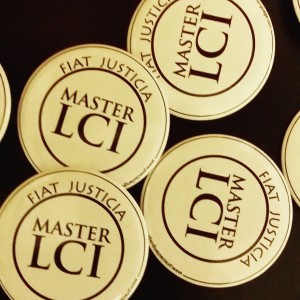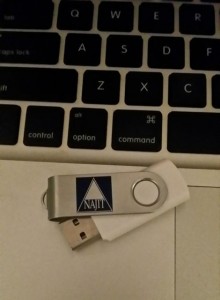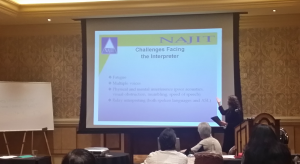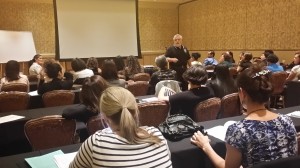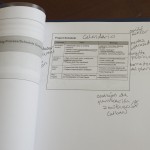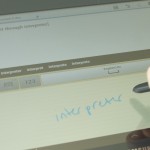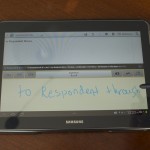I read the news about Waverly Labs’ new in-ear realtime translation device (video below) with great interest. With rapid advances in artificial intelligence (AI), interpreters are sometimes asked if technology will soon replace us. The short answer is that technology definitely assists good interpreters and translators, and may eliminate the need for expenditure of human brain effort on certain large-volume, low-priority projects. But, while I do embrace new technology to assist me in my translation and interpreting work, I’m not the least bit concerned that it will send me to the unemployment line.
Continue reading
Category Archives: For Interpreters
Fiat Justicia – Master LCI Awareness
When Court Certified Isn’t Enough
I’m always glad when a potential client calls me for the first time to check availability and rates. And I really like it when they also ask, “By the way, you are court certified, right?” This tells me the client is interested in doing things right—my kind of client. But, before I answer that question, I always have an internal debate over how detailed my answer should be. Normally, I conclude that they just want to know if I’m qualified to interpret for the assignment they are asking me about. So, I just say, “Yes.”
But, at least here in Texas, this seemingly straightforward question is actually quite complicated. I hope this post will shed some light on qualifications for court interpreters in Texas. Continue reading
NAJIT Conference Wrap-up
I am freshly returned from a weekend at the National Association of Judicial Interpreters and Translators annual conference in Las Vegas, Nevada.
Before getting into some of the details of what I learned, I’d like to mention that this organization has a long history of working to advance the profession and advocating for both interpreting/translation professionals and those with limited English proficiency who use our services in the judicial system. The conference had around 200 attendees, and it was an honor to be surrounded by so many pioneers of our profession. NAJIT brings together human resources from the most progressive jurisdictions in the country, creates resources for its members, and advocates for our noble profession at the national level. I highly recommend NAJIT membership to anyone involved in translation/interpretation in the legal field.
As for the details, one of my main motivations in attending this conference was the 8-hour seminar taught by Tony Rosado on Mexico’s recently enacted reforms to its judicial processes. Historically, the oral proceedings we interpret in the U.S. have generally not had direct counterparts in Spanish-speaking countries, where cases were resolved entirely in writing, through briefs and judicial opinions.
This dissimilarity meant that the Spanish terminology we study as court interpreters was always an exercise in description as we searched for terms that expressed each aspect of the U.S. judicial process in a way that would be understood by a Spanish speaker despite the lack of an equivalent proceeding in his or her home country. For example, an arraignment is a court hearing in which the defendant, his attorney, the prosecutor, and the judge convene for a formal reading of the charges against the defendant. There was no equivalent hearing, thus there was no single, authoritatively correct, Spanish term. Instead, as a profession we continuously develop a lexicon of accepted terms, with no small amount of scholarship and debate along the way.
Now, after years of ramping up for the change, Mexico is converting its judicial system to one of oral proceedings like that of the United States. The most immediate effect for U.S.-based judicial interpreters is that there is now a body of Spanish-language legislation that officially names the equivalent concepts for many of our judicial proceedings. This is also a revolution for the practice of law in Mexico, and there are already thousands of pages written in Mexico’s scholarly journals on the advantages and disadvantages of oral proceedings, as well as volumes of books published to prepare the bar for oral practice.
Interestingly, Mexico’s new legislation codifies the right to interpreters for those who do not speak Spanish or do not speak it well, in much more detail than does the United States’ legislation. There are current efforts to develop licensing and training programs from the ground up, to train interpreters for this type of work, which previously had not been needed in most Mexican jurisdictions.
I recommend following Tony’s blog for updates as these changes take effect.
Thank you to all the presenters and NAJIT for hosting such an excellent event.
UT Arlington – Choose Your Own Adventure – Professional Translator/Interpreter Resources
It was a great pleasure to visit my alma mater, UT Arlington, today, and talk with a great group of students and professionals.
Here are direct links to the resources I mentioned during the talk:
- Corinne McKay’s Tips for Newcomers to the Translation and Interpreting Professions
- Harry Obst’s book The White House Interpreter
- Daniel Sanchez Reinaldo’s blog on TV interpreting (Spanish)
- Metroplex Interpreters and Translators Association (Next event in December)
- American Translators Association
- Texas Association of Health Interpreters and Translators
- Texas Association of Judiciary Interpreters and Translators
- Texas Licensed Court Interpreter examination
- Federal Court Interpreter Certification Exam
- Bureau of Labor Statistics – Occupational Outlook for Translators and Interpreters
- Apple Job Listing – Technical Translator (Mexican Spanish)
- ATA Compensation Survey Summary (PDF)
- Erik Hansson’s list of translators and interpreters on Twitter
- Follow me on Twitter
One thing I’d like to underline is that it’s easy to feel a little lost starting out in this profession. Don’t be afraid to find your own path, but also know that there are many, many colleagues who will be happy to give you tips and help you along.
Finally, if you’re ready to start going through the steps of setting up your translation business, I recommend you check out Corinne McKay’s online course, How to Succeed as a Freelance Translator.
Correction: My slides included incorrect information for passing scores for the Texas Licensed Court Interpreter exam. The minimum passing score for a Basic license is 60% and the minimum passing score for a Master license is 70%. I’m grateful to the colleague who alerted me to this error.

The Paperless Interpreter Experiment: Part II
When I posted about my first experiment with paperless interpreting a few months back, I heard from interpreters around the world who had come to the same conclusion: the iPad is great for accessing references, but not for taking notes while interpreting.
- The old way. Don’t mind my handwriting.
- The old way: Pen and paper. The paper never runs out of battery but even my favorite pens (TUL) betray me sometimes.
But I’m happy to announce that I have since gone (nearly) paperless, thanks to the Galaxy Note Tab 10.1.
- Size comparison to my usual legal pad
First the summary, then the details. Click on any photo to see a larger version.
Summary:
While it’s still not a perfect device, the Galaxy Note fulfills my requirements and continues to delight me. I still bring half a reporter’s pad to interpreting jobs out of paranoia (and to jot down unusual spellings for the court reporter), but I’ve now successfully used the Galaxy tab rather than paper for notetaking for several months.
The Experiment
Hardware: Samsung Galaxy Note Tab 10.1″ + integrated stylus
- Samsung Galaxy Tab with Samsung’s magnetized book case
- Samsung’s magnetized book case
Apps:
- S-Note (included)
- iAnnotatePDF (free)
- Dolphin Browser (free)
Results
- Interpeting Notes. PASS
This is the first tablet I’ve found that is actually designed for handwriting. l like that the tablet will register my actual handwriting for interpreting notes, as opposed to converting handwriting to typed text.
- Finally, a tablet designed for a stylus
- My handwriting naturally borders on illegible during interpreting, but you can see that the tab doesn’t distort my writing at all.
The Note integrates its stylus in a lot of neat ways, with the Android customizability that I’ve grown to love. l can set a shortcut so that a program of my choosing opens automatically when I dislodge the stylus from its nest. Also, when the stylus is disconnected, certain programs turn off recognition of my hand or fingers entirely, rather than masking certain parts of the screen à la iPad.
My fingers do occasionally hit the OS taskbar and open menus unintentionally, but I fully expect to find an app that allows me to customize the taskbar as I did with my Android phone (which I’ve set to hide the taskbar that shows battery, network, etc. until I pull down from the top of the screen with two fingers).
- Reference: PASS
Glossaries and apps are equally accessible as with iPad but this tablet has a couple of additional capabilities that knocked my socks off:
Split screen. The Note allows true multi-tasking, with split screen or moveable floating windows.
- Split screen: S-Note on the left, Dolphin Browser on the right
- Printed notes from iAnnotate
iAnnotate. This app allows me to overlay handwritten notes on a PDF. I can export the whole thing to a PDF and store it in Evernote, email it, or print it.
- Work during downtime: FAIL
It was only fair to fail the Note in this area because it won’t replace my laptop entirely. However, I definitely use the Note for word processing much more than the iPad.
Composing documents using handwriting recognition has enabled me to get more done during those little lulls between interpreting jobs that are too short to go back to the office. The handwriting recognition engine is the best I’ve seen, by far. Rather than recognizing strokes or letters, the engine recognizes the whole word as I write, even if I go back and add a letter in the middle of the word. The latest update also fixes an annoying need to manually add a space after each word.
- Handwriting recognition – words
- Handwriting recognition
- Handwriting recognition – phrases
Note: The photos show an inaccurate conversion because I took the photos while the handwriting was still visible to show the engine at work. Once I stop writing, the recognition engine finalizes its choice, which is usually correct, but by that time the handwriting is no longer visible.
The downsides to real work on the Note is that it requires a Microsoft-compatible app rather than allowing me to actually use Microsoft Office. This means that formatting sometimes gets messed up after I open a document in the tablet. Interacting with Word and Excel documents is definitely easier with the Note’s stylus compared to the iPad, though.
If this were my top priority l would buy the Surface, which offers the real Microsoft Office and very sleek external keyboards.
- Entertainment: PASS
As l mentioned last time, my criteria are low for this, but l can use Twitter and read the Economist.
So there you have it, a perfect excuse to justify a new gadget as a business expense and save some trees at the same time. What do you say?
Update – 2013 Federal Court Interpreter Exam
Yesterday, registration opened for Phase II of the Federal Court Interpreter Certification Exam. Since I was fortunate enough to pass Phase I (Written) last year, I registered right away to (hopefully) test for Phase II in my home city. This way, I can avoid combining travel stress with the stress of a test that won’t be available for another two years if I fail it. Which won’t happen, of course. (Positive thinking…)
FCICE has announced that the exams will be administered the week of July 15th, but it seems we won’t have a firm date until after the registration period closes on May 17th.
After the exam, FCICE warns us that Spanish applicants may have to wait up to 13 weeks for results. Applicants for other languages may have to wait even longer. Which means that I will probably check my mailbox at least 78 times from July to October, or 65 if Saturday delivery is canceled.
Did you also pass Phase I last year? Go straight to the Phase II registration page here. Thinking of starting the FCICE process when the written exam is administered next year? There are some materials available, including a practice oral exam.
Announcement – 2013 Federal Court Interpreter Exam
A few months back, I received the great news that I had passed the Phase One (Written) portion of the Federal Court Interpreter Certification Exam. Since then, I have been compulsively checking the FCICE web page to see when registration will open for the Phase Two (Oral) Exam. Since the Phase Two exam is only offered in odd-numbered years (2013, 2015, 3001, etc.), I have been eager to set up my study timeline and meet this beast head on in 2013.
So I am thrilled to announce that the wait is over, as the FCICE has announced the registration period:
- Registration Opens: Monday, March 25, 2013 8:30 A.M. ET
- Registration Closes: Friday, May 17, 2013 at 5:00 P.M. ET
No word yet on actual exam dates, but I registered for the Phase One exam in May 2012 (got the last slot in the location most convenient to me, whew!) and all exams were administered within a short period in August 2012. It looks like this year’s timeline may be similar. More details at the FCICE site.
3 Easy Ways to Improve Your Speaking Voice
Have you ever felt a weakness in your throat after a day of presenting or a particularly stressful interpreting job? I’ve had this problem on many occasions, especially when I started out. My vocal cords simply weren’t used to speaking for hours on end under high stress, for example during simultaneous conference interpreting or hostile witness examinations.
 Me and a fabulous interpreting partner, Karla Badillo, at the International Baseball Federation. A good partner eases stress and splitting the work prevents vocal strain.
Me and a fabulous interpreting partner, Karla Badillo, at the International Baseball Federation. A good partner eases stress and splitting the work prevents vocal strain.
For interpreters and anyone who makes presentations, your voice is part of your livelihood. So, protecting and improving it is a no-brains investment in your primary business asset—you. And vocal health is not just for interpreters. Translators who make sales presentations, speak with clients on the phone, or lead professional development events can also benefit. A pleasant speaking voice can even lead to a new income stream in thevoiceover market.
Fortunately, it doesn’t take a lot of time or effort to develop a pleasant speaking voice. I’ve taken singing lessons and attended a workshop with a voiceover coach, but allow me to save you a few hundred dollars with three simple strategies for vocal improvement:
1. Use better posture.
Sit or stand straight to improve clarity. Your instrument is an L-shaped tunnel (throat and mouth) and for the best sound, you want that tunnel to be as wide open as possible. I’ve seen interpreters hunched behind a defendant or leaning forward over their notes, which naturally compresses the throat and muffles articulation.
Try this:
Do interpretation exercises or practice your presentation while standing with your back against the wall. Notice how this body alignment feels and get used to speaking from this position.
2. Breathe deeply.
Before my singing lessons, I honestly did not know what it feels like to have my lungs full of air. If your lungs are actually full, you feel the lungs pressing against the ribs in your back and down against your stomach. Untrained vocalists breathe shallow breaths, filling only the top half of the lungs. As a result, the vocal cords work harder than they would if there were proper breath support and fatigue faster. With proper breath support, your voice will sound fuller and more pleasant.
Try this:
Take a coffee stirrer (very narrow straw) in your mouth and inhale through it very slowly until you can no longer take in any more air. Hold the air for as long as you can, then remove the stirrer and exhale as slowly as you can (try counting to 10 for each stage). Do this exercise for 5 minutes a day to practice proper breathing and strengthen the muscles that control your lungs.
3. Care for your vocal instrument.
If you’ve read this far, you probably agree that vocal health is important. Consider choosing one or two of the following to protect and heal your vocal system:
- Limit alcoholic, caffeinated, and carbonated drinks
- Stop smoking
- Keep your vocal cords lubricated with plenty of water (cool to warm is much better than icy or hot water)
- Avoid coughing (yes, it really is possible!)
- Avoid extended periods of whispering or shouting
Finally, remember to give your voice a rest whenever you start to note signs of vocal strain. Forcing yourself to speak in spite of warning signs like hoarseness or pain can result in polyps and permanent damage to the vocal cords.
These are the strategies that have helped me most. Do let me know if you try these and see any results, and feel free to add any of your own advice in the comments.

